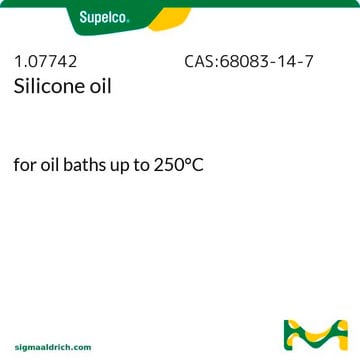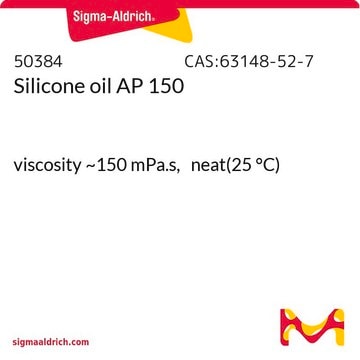Products may be shipped at a different temperature than the recommended long-term storage temperature. If the product quality is sensitive to short-term exposure to conditions other than the recommended long-term storage, it will be shipped on wet or dry-ice. If the product quality is NOT affected by short-term exposure to conditions other than the recommended long-term storage, it will be shipped at ambient temperature. As shipping routes are configured for minimum transit times, shipping at ambient temperature helps control shipping costs for our customers. For more information, please refer to the Storage and Transport Conditions document: https://www.sigmaaldrich.com/deepweb/assets/sigmaaldrich/marketing/global/documents/316/622/storage-transport-conditions-mk.pdf
85409
Silicone oil
Sinónimos:
Dimethyl polysiloxane
Seleccione un Tamaño
$117.90
Precio de catálogo$131.00Ahorre 10 %Disponible para envío el07 de abril de 2025Detalles
Seleccione un Tamaño
About This Item
$117.90
Precio de catálogo$131.00Ahorre 10 %Disponible para envío el07 de abril de 2025Detalles
Productos recomendados
densidad de vapor
>1 (vs air)
Nivel de calidad
presión de vapor
<5 mmHg ( 25 °C)
5 mmHg ( 20 °C)
Formulario
oil
índice de refracción
n20/D 1.403 (lit.)
n20/D 1.406
viscosidad
100 mPa.s(20 °C)
bp
>140 °C/0.002 mmHg (lit.)
densidad
0.967 g/mL at 20 °C
¿Está buscando productos similares? Visita Guía de comparación de productos
Categorías relacionadas
Descripción general
Código de clase de almacenamiento
10 - Combustible liquids
Clase de riesgo para el agua (WGK)
WGK 1
Punto de inflamabilidad (°F)
214.0 °F - closed cup
Punto de inflamabilidad (°C)
101.1 °C - closed cup
Equipo de protección personal
Eyeshields, Gloves
Elija entre una de las versiones más recientes:
¿Ya tiene este producto?
Encuentre la documentación para los productos que ha comprado recientemente en la Biblioteca de documentos.
Los clientes también vieron
-
How is shipping temperature determined? And how is it related to the product storage temperature?
1 answer-
Helpful?
-
-
How can I determine the shelf life / expiration / retest date of this product?
1 answer-
If this product has an expiration or retest date, it will be shown on the Certificate of Analysis (COA, CofA). If there is no retest or expiration date listed on the product's COA, we do not have suitable stability data to determine a shelf life. For these products, the only date on the COA will be the release date; a retest, expiration, or use-by-date will not be displayed.
For all products, we recommend handling per defined conditions as printed in our product literature and website product descriptions. We recommend that products should be routinely inspected by customers to ensure they perform as expected.
For products without retest or expiration dates, our standard warranty of 1 year from the date of shipment is applicable.
For more information, please refer to the Product Dating Information document: https://www.sigmaaldrich.com/deepweb/assets/sigmaaldrich/marketing/global/documents/449/386/product-dating-information-mk.pdfHelpful?
-
Active Filters
Nuestro equipo de científicos tiene experiencia en todas las áreas de investigación: Ciencias de la vida, Ciencia de los materiales, Síntesis química, Cromatografía, Analítica y muchas otras.
Póngase en contacto con el Servicio técnico



